A smooth checkout process can make or break your online store. When customers reach your checkout page, they’ve already decided to buy. Any friction here costs you sales. The right checkout plugin eliminates these barriers and boosts your conversion rates.
Recent studies show that the average cart abandonment rate across industries sits at around 70%. This means most potential sales never complete. The primary reasons include complicated checkout processes, unexpected costs, and limited payment options. A proper checkout plugin solves these issues.
In this guide, we’ll explore the best checkout plugins for WordPress in 2025. We’ll compare features, pricing, and use cases to help you make the right choice for your business. Let’s find the perfect solution for your online store.
Understanding Checkout Plugins for WordPress
Checkout plugins serve as the backbone of your eCommerce store’s payment system. They handle the entire transaction process, from product selection to payment confirmation. A quality checkout plugin integrates seamlessly with your WordPress site and payment gateways.
The right checkout solution does more than just process payments. It creates trust, reduces friction, and guides customers toward completing their purchase. For online stores, this directly affects bottom-line revenue. Every percentage point improvement in checkout completion can significantly boost your sales.
WordPress users have many checkout options available. Some are full eCommerce platforms with built-in checkout functionality. Others focus solely on the payment process. Your business needs will determine which type works best for you.
Checkout plugins connect your store with payment processors like PayPal, Stripe, and dozens of other services. They handle security requirements, tax calculations, and shipping options. The best plugins make all this complexity invisible to your customers.
Top WordPress Checkout Plugins
Let’s examine the leading checkout plugins for WordPress, starting with the dominant market leader.
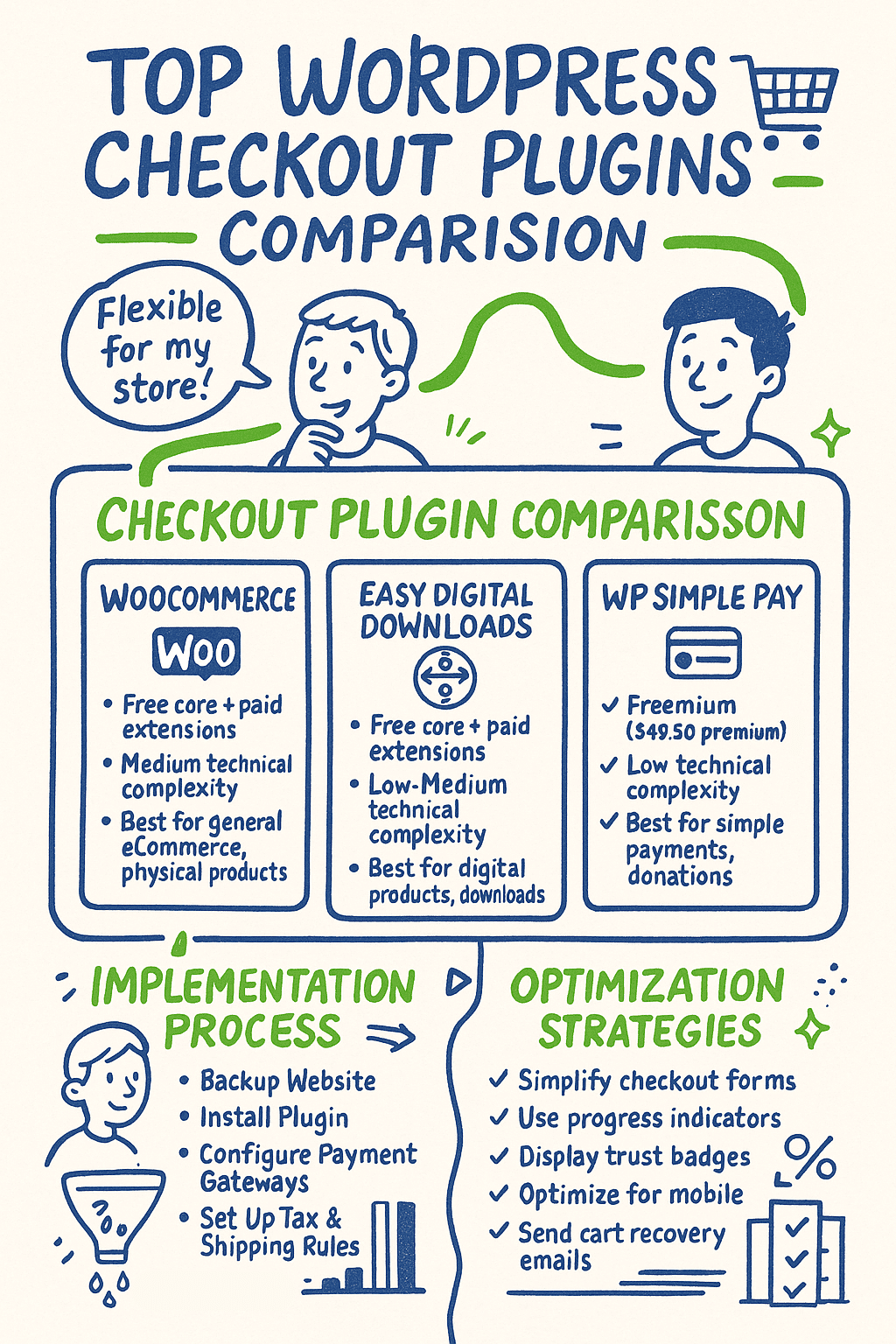
WooCommerce
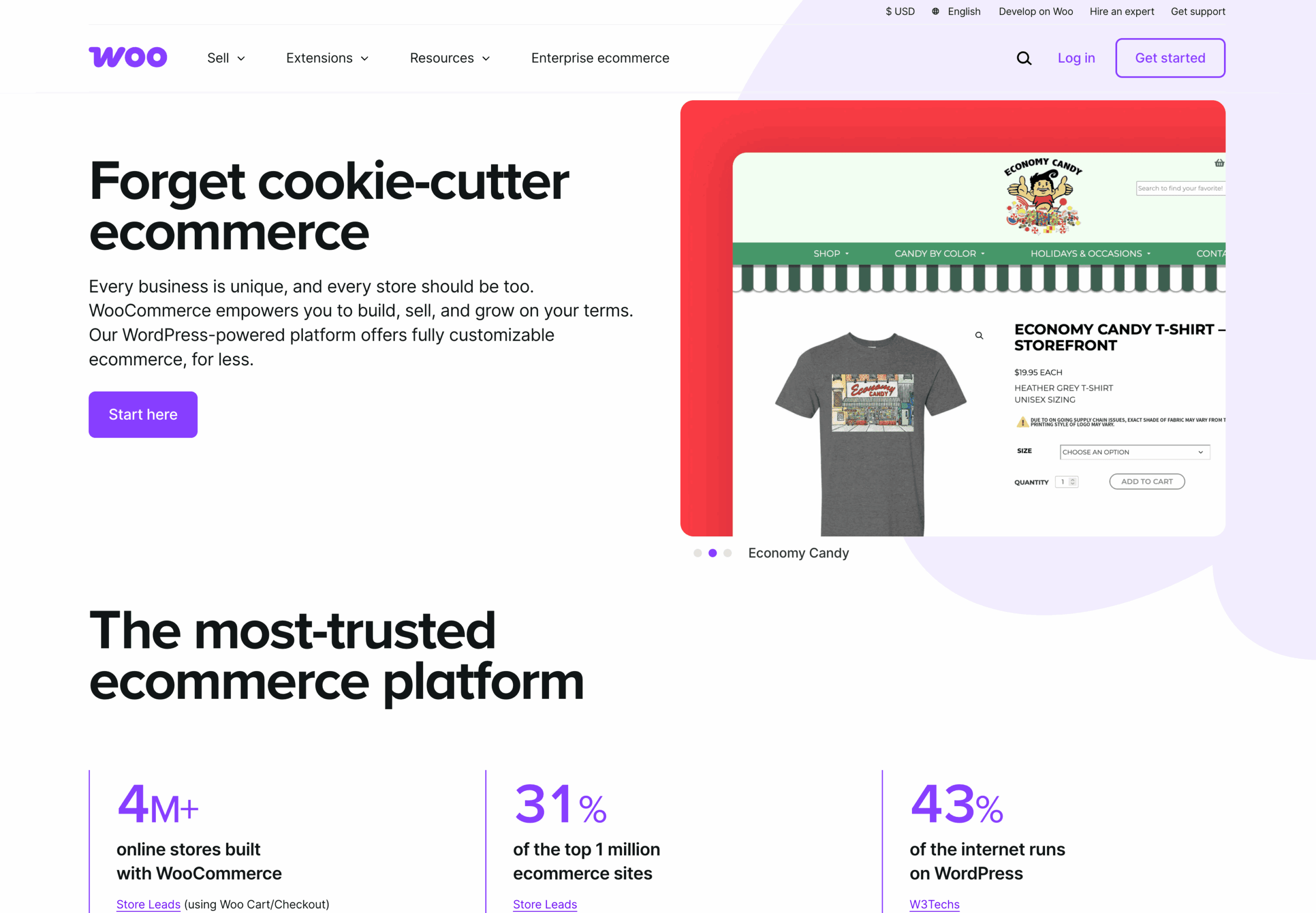
WooCommerce stands as the undisputed leader in WordPress eCommerce, powering 6.7 million live websites with over 5 million active installations of its free plugin.
This popular platform transforms any WordPress site into a full-featured online store. WooCommerce includes a robust checkout system that handles everything from product variations to tax calculations. Its core plugin comes free, with premium extensions available for additional functionality.
Key strengths include massive community support, countless integration options, and regular updates. The plugin works with virtually every payment gateway and offers extensive customization options. For most WordPress site owners, it provides the perfect balance of power and ease of use.
WooCommerce continues to grow steadily, with recent data showing a 0.7% quarter-over-quarter increase in active stores.
Easy Digital Downloads
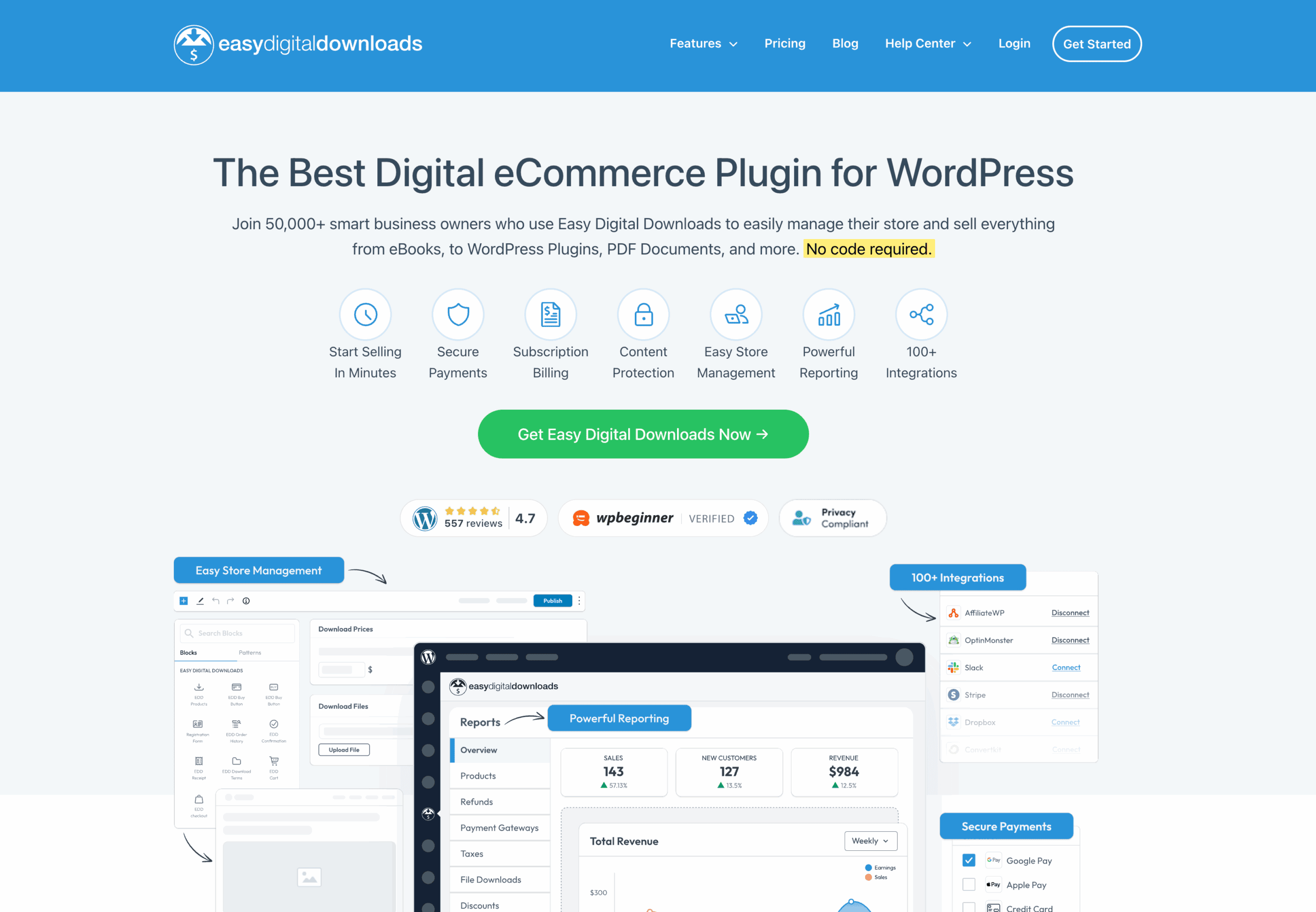
Easy Digital Downloads (EDD) specializes in selling digital products. While WooCommerce excels with physical goods, EDD offers a streamlined experience specifically designed for downloads, subscriptions, and virtual items.
The plugin provides file protection, download limits, and customer management tools. Its checkout process is optimized for digital delivery, eliminating unnecessary steps like shipping information. For creators selling eBooks, software, music, or online courses, EDD offers the perfect balance.
Recent updates have enhanced the user experience while maintaining the focused approach that made EDD popular. The plugin offers both free and premium versions, with the free option providing substantial functionality for new stores.
WP Simple Pay
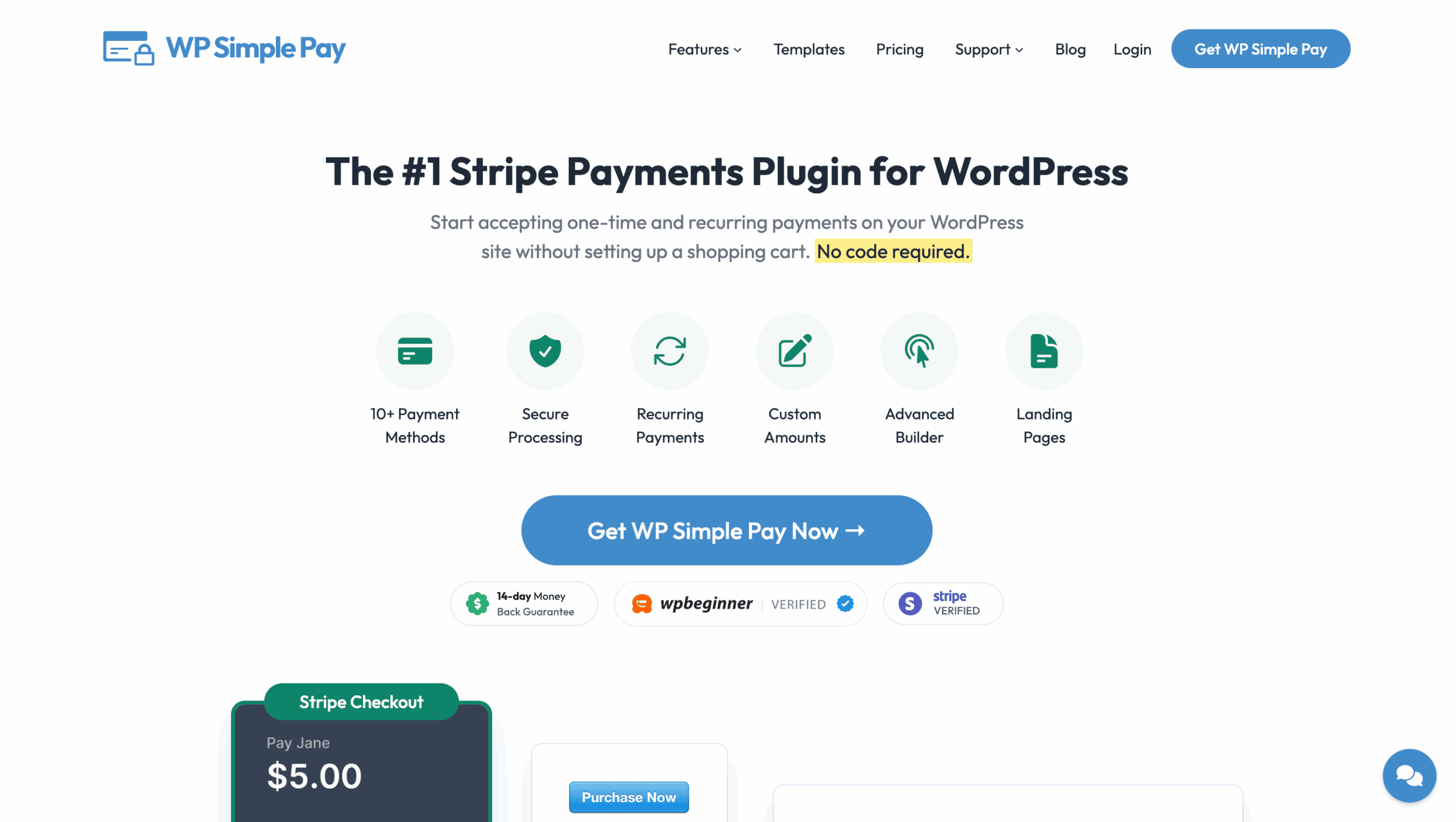
WP Simple Pay takes a different approach by focusing exclusively on payment collection rather than full eCommerce functionality. This lightweight plugin creates simple payment forms that integrate directly with Stripe.
For businesses that need to collect payments without a traditional shopping cart, WP Simple Pay offers an ideal solution. It works well for donations, service payments, deposits, and memberships. The streamlined checkout reduces friction and improves conversion rates.
The plugin offers both free and premium versions. The premium version adds features like subscription payments, payment form templates, and custom fields. For simple payment collection needs, few solutions match its ease of use.
Additional Notable Options
While the plugins above lead the market, several other excellent options deserve consideration:
| Plugin | Best For | Key Strength |
|---|---|---|
| CheckoutWC | WooCommerce stores seeking optimization | Optimized one-page checkout experience |
| WP EasyCart | Small to medium businesses | All-in-one simplicity |
| MemberPress | Membership sites | Recurring billing and access control |
| CartFlows | Conversion optimization | Advanced checkout flow customization |
Each plugin fills a specific niche in the market. Your choice depends on your business model, budget, and specific requirements.
Key Features to Look for in Checkout Plugins
When evaluating checkout plugins for your WordPress site, consider these essential features. The right combination will improve your conversion rates and customer satisfaction.
- Payment Gateway Options – Support for major payment processors (PayPal, Stripe, credit cards) and local payment methods gives customers flexibility
- Mobile Optimization – With more than half of online shopping happening on phones, responsive design is crucial
- Security Features – PCI compliance, SSL support, and fraud protection keep customer data safe
- Customization Options – Ability to match your brand and optimize the checkout flow
Cart Recovery Tools – Features that recapture abandoned carts through emails or notifications
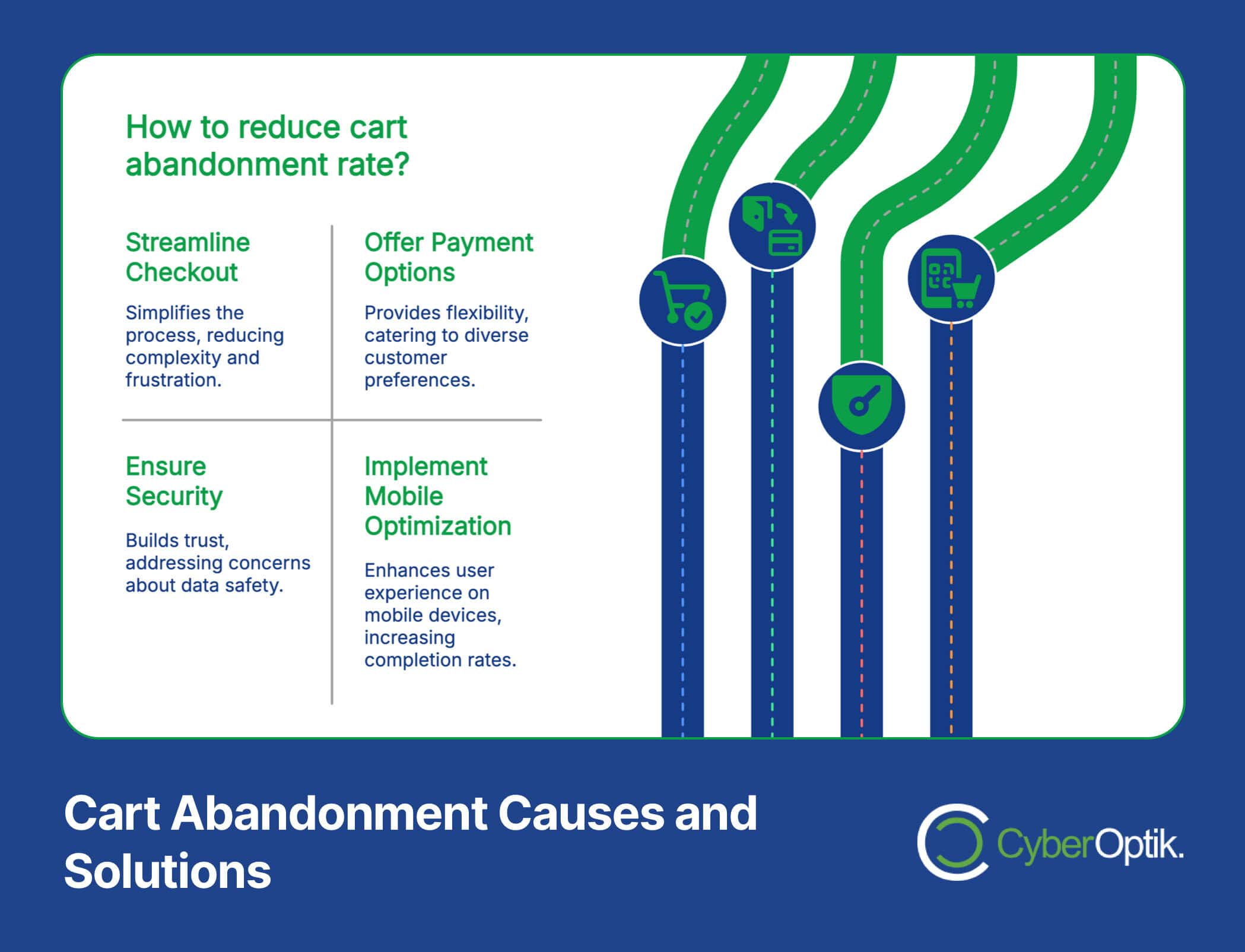
Beyond these basics, consider specific needs for your business model. Subscription businesses need recurring billing tools. Digital sellers need secure delivery systems. International merchants need multi-currency support and varied payment options.
The user experience during checkout directly impacts your conversion rates. Look for plugins that offer features that prevent common eCommerce checkout problems, such as one-page checkout options, guest checkout capabilities, and progress indicators.
Plugin Comparison: Making the Right Choice
To help you determine which eCommerce solution best fits your business needs, we’ve created this comprehensive comparison of the top checkout plugins. This analysis covers pricing, features, ease of use, and ideal business types.
| Plugin | Pricing Model | Technical Complexity | Best For |
|---|---|---|---|
| WooCommerce | Free core + paid extensions | Medium | General eCommerce, physical products |
| Easy Digital Downloads | Free core + paid extensions | Low-Medium | Digital products, downloads |
| WP Simple Pay | Freemium ($49.50+ for premium) | Low | Simple payments, donations |
| CheckoutWC | Premium only ($149+) | Low | WooCommerce optimization |
| MemberPress | Premium only ($179+) | Medium | Membership sites, subscriptions |
The market dominance of WooCommerce gives it a significant advantage, with the platform holding 38.76% market share among e-commerce platforms, surpassing competitors like Shopify.
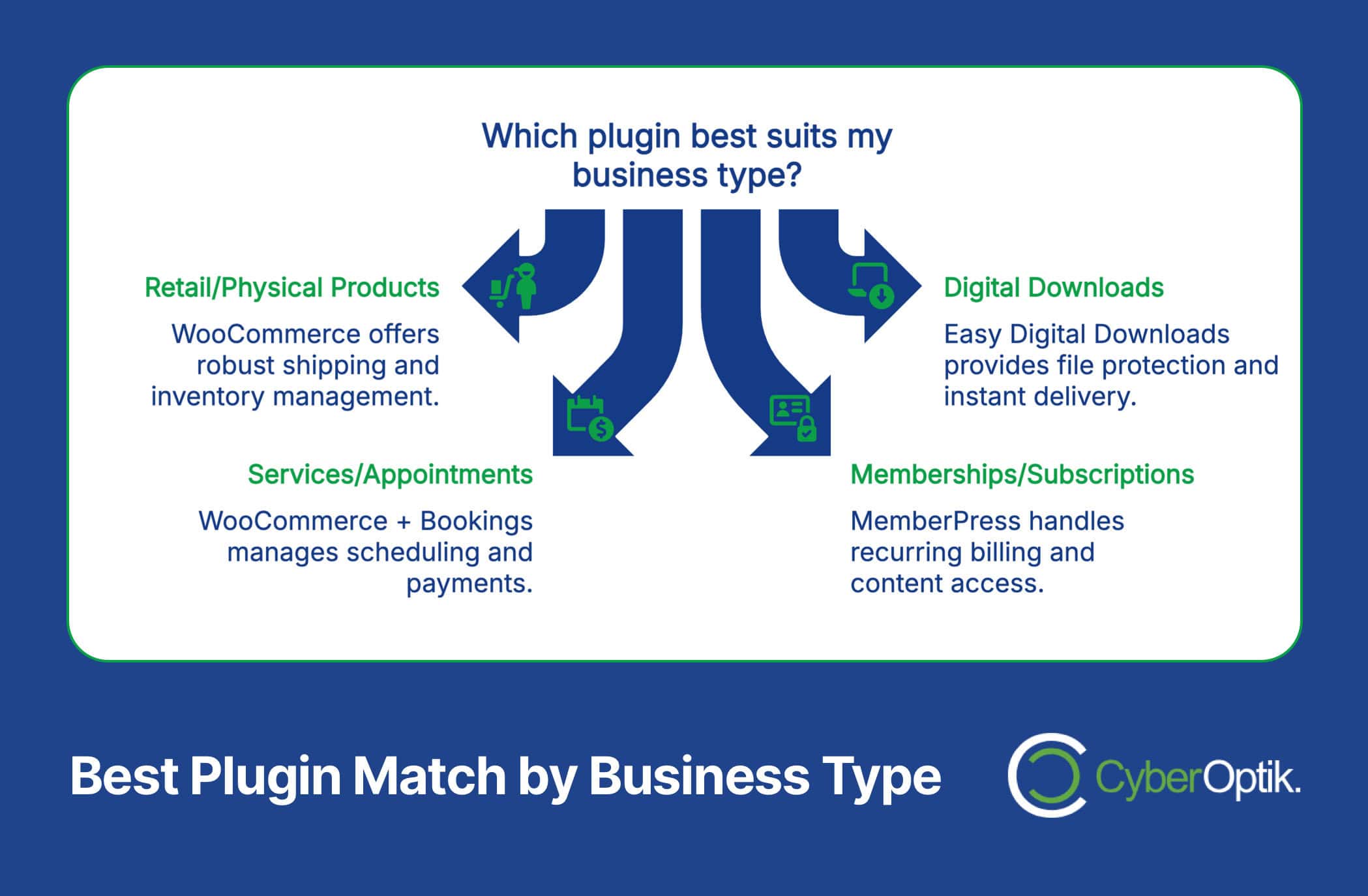
| Business Type | Recommended Plugin | Reason |
|---|---|---|
| Retail/Physical Products | WooCommerce | Robust shipping, inventory, and product variation handling |
| Digital Downloads | Easy Digital Downloads | Specialized features for file delivery and licensing |
| Services/Appointments | WooCommerce + Bookings extension | Combines payment processing with scheduling capabilities |
| Memberships/Subscriptions | MemberPress | Purpose-built for recurring payments and content restrictions |
| Donations/Fundraising | WP Simple Pay | Streamlined forms with variable payment amounts |
The technical demands of each solution vary significantly. Some require developer assistance for customization, while others work effectively out of the box. Consider your team’s technical capabilities when making your selection.
Implementation Best Practices
Once you’ve selected the right checkout plugin, proper implementation ensures maximum benefit. Follow these steps for a successful setup:
- Back up your website before installation
- Install the plugin through WordPress admin panel
- Configure payment gateways and account connections
- Set up tax rules and shipping options if applicable
- Customize the checkout form fields and layout
- Test the complete checkout process thoroughly
- Implement analytics tracking to monitor performance
When implementing your checkout system, avoid these common pitfalls that can damage your conversion rates:
- Requiring account creation – Always offer guest checkout options
- Overly complex forms – Remove unnecessary fields
- Hidden fees revealed late – Display all costs early in the process
- Limited payment options – Include various payment methods
Security deserves special attention during implementation. Ensure your site uses HTTPS with a valid SSL certificate. Set up strong administrator passwords and keep all plugins updated. Regular security scans help identify potential vulnerabilities before they become problems.
| Security Feature | WooCommerce | Easy Digital Downloads | WP Simple Pay |
|---|---|---|---|
| PCI Compliance | Via payment gateways | Via payment gateways | Inherits from Stripe |
| Fraud Protection | Via extensions | Basic included | Inherits from Stripe |
| Data Encryption | Yes | Yes | Yes |
| GDPR Tools | Comprehensive | Basic | Basic |
For complex implementations, consider working with a professional developer or agency. The investment in proper setup pays dividends through higher conversion rates and fewer technical issues.
Optimization Strategies for Your Checkout Process
After implementation, continuous optimization helps maximize your checkout conversion rates. Understanding the core principles of e-commerce optimization will help you make data-driven improvements.
Start by analyzing your current checkout performance. The average checkout abandonment rates vary by industry, with these typical patterns:
| Industry | Average Abandonment Rate | Primary Abandonment Reason |
|---|---|---|
| Fashion | 68.3% | Shipping costs |
| Electronics | 65.7% | Price comparison |
| Food & Beverage | 72.2% | Delivery time concerns |
| Beauty & Cosmetics | 74.3% | Trust issues |
| Home Goods | 73.9% | Shipping costs |
Implement these proven strategies to improve your checkout completion rates:
- Simplify the process – Reduce form fields and steps whenever possible
- Add progress indicators – Show customers where they are in the checkout flow
- Implement trust signals – Display security badges, reviews, and guarantees
- Optimize for mobile – Ensure smooth functioning on all screen sizes
- Set up cart abandonment recovery – Email reminders for incomplete checkouts
A/B testing different checkout configurations helps identify what works best for your specific audience. Test one element at a time to clearly understand what impacts your conversion rates. Common elements to test include button colors, form layouts, and payment option ordering.
The concept of strategic marketing for eCommerce success extends beyond the checkout page itself. Your entire customer journey should lead smoothly to a conversion-optimized checkout experience.
Conclusion
The right checkout plugin creates a seamless purchasing experience that converts browsers into buyers. For most WordPress businesses, WooCommerce offers the ideal combination of features, customization options, and support. Specialized businesses may benefit from purpose-built solutions like Easy Digital Downloads or WP Simple Pay.
Remember that implementation quality matters as much as plugin selection. Follow best practices, emphasize security, and continuously optimize your checkout process based on user data. Regular testing and updates ensure your checkout system remains effective and secure.
When selecting your checkout plugin, prioritize your specific business needs over general popularity. Consider your products, customer expectations, technical capabilities, and growth plans. The best solution is one that aligns perfectly with your unique business requirements.
We help Chicago businesses implement effective eCommerce solutions that drive real results. Whether you need assistance selecting the right platform, customizing your checkout process, or optimizing conversion rates, our team brings both technical expertise and strategic insight to your project.




